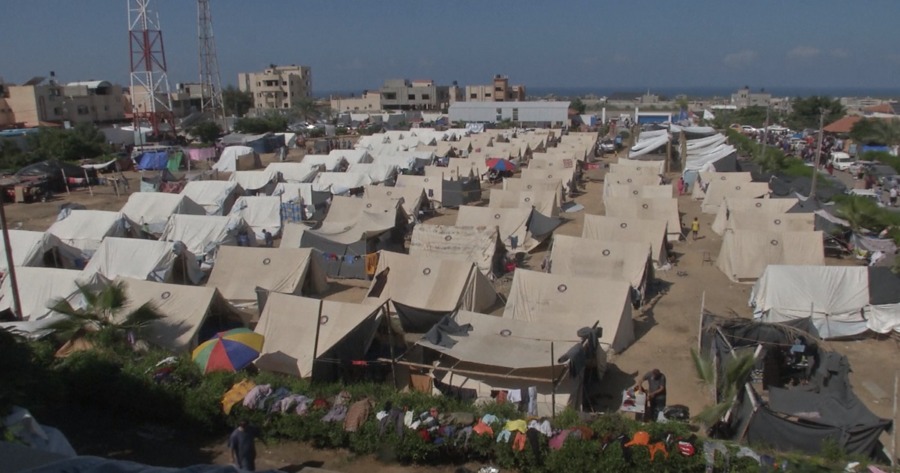Over 35,000 Palestinians in Tents: The Urgent Humanitarian Crisis Unfolding in Gaza
- Naomi Dela Cruz
- Middle East
- Trending
- October 23, 2023

On the 13th of October, the Israel Defense Forces (IDF) ordered the citizens of Northern Gaza to evacuate to the Southern Gaza, setting off a humanitarian crisis of massive proportions. The consequences of this evacuation have been dire, with over a million Palestinians fleeing their homes, some taking shelter in the UN’s tent camp in Khanyounis city in Southern Gaza. The situation is dire, CGTN correspondent in Gaza, Noor Harazeen, brings us an on-the-ground perspective of the unfolding crisis.
Al-Mawassi Camp, the newest Palestinian refugee camp in Gaza, is now home to more than 35,000 displaced individuals. The UN Relief and Works Agency for Palestine Refugees (UNRWA) has erected numerous tents in this camp to house families primarily evacuated from Jabalia and Bit-lahiya refugee camps in Northern Gaza. This development eerily resembles scenes from the Palestinian Nakba camps in 1948 when hundreds of thousands of Palestinians were forcibly displaced.
Amidst the tented dwellings, the refugees face grim conditions. One resident, Um Maohammed, a refugee from Jabalia, lamented, “They put us in tents, look around, there is no water, no soap, no blankets, there is nothing here for us. There is no life; even the donated bread is old and dry.”
Access to basic necessities like fuel, electricity, and the internet remains a distant memory for those residing in the camp. The people’s only respite comes in the form of sporadic deliveries of canned food packages. In these harsh circumstances, resilience shines through, as stories like that of Hussein Al-Najjar and his family demonstrate. They managed to cook a pot of chicken soup to feed his ten family members, showcasing the strength of the human spirit amidst adversity.
Hussain Al-Najjar, another refugee from Bit-lahiya, shared the heart-wrenching reason behind their exodus: “I am from northern Gaza, from Bit-Lahiya, we ran from the continuous Israeli airstrikes on our neighborhood. We ran from the gas and phosphorus. We had to evacuate here in Khanyounis to protect our children and ourselves from the bombings.” The fear of ongoing conflict, along with the devastating use of certain munitions, forced these families to leave their homes.
On Saturday, Egypt reopened the Rafah border crossing with Gaza, allowing 20 aid trucks to enter the coastal enclave. However, the situation is far from resolved, as it will take days for UN workers in Gaza to sort and distribute the aid. Adnan Abu-Hassna, the spokesperson for the UN in Gaza, expressed the dire need for immediate assistance, stating that Gaza requires at least 100 aid trucks per day to meet its basic needs. “What entered is good but it’s not enough,” he emphasized. “We need at least 100 trucks, otherwise we will be dealing partially.”
The Palestinian population has been left disappointed, as Egypt closed the Rafah border shortly after allowing the initial 20 trucks of humanitarian aid into Gaza. The uncertainty surrounding the timeline for further aid and the ongoing displacement of citizens adds to the sense of urgency and desperation in the region.
The humanitarian crisis that has unfolded in Gaza following the IDF’s evacuation orders is nothing short of a catastrophe. Thousands of people are now living in dire conditions, with limited access to basic necessities and uncertainty about when further aid will arrive. The world must come together to address this crisis promptly and provide the support and resources needed to alleviate the suffering of the people in Gaza. As the situation continues to evolve, it is essential to remember the importance of diplomacy and dialogue in preventing such humanitarian tragedies in the future.








